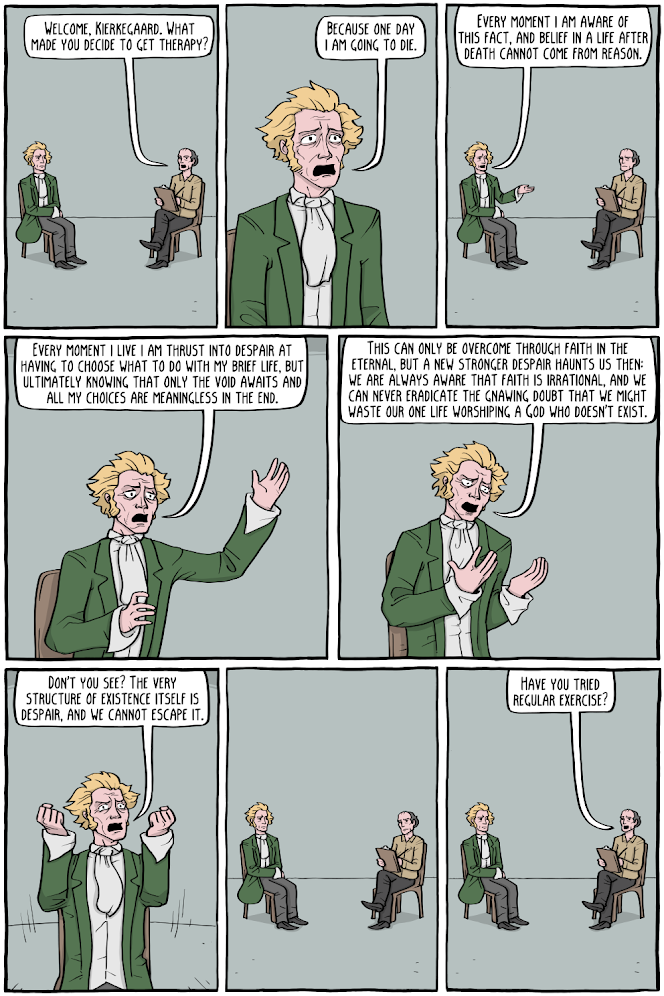Artist: Bob Mankoff, April 2019
Launched on Nov 29 2006, now 2,100+ posts...This bilingual blog - 'आन्याची फाटकी पासोडी' in Marathi- is largely a celebration of visual and/or comic ...तुकाराम: "ढेकणासी बाज गड,उतरचढ केवढी"...George Santayana: " Everything in nature is lyrical in its ideal essence, tragic in its fate, and comic in its existence"...William Hazlitt: "Pictures are scattered like stray gifts through the world; and while they remain, earth has yet a little gilding."
मेघदूत: "नीचैर्गच्छत्युपरि च दशा चक्रनेमिक्रमेण"
समर्थ शिष्या अक्का : "स्वामीच्या कृपाप्रसादे हे सर्व नश्वर आहे असे समजले. पण या नश्वरात तमाशा बहुत आहे."
G C Lichtenberg: “It is as if our languages were confounded: when we want a thought, they bring us a word; when we ask for a word, they give us a dash; and when we expect a dash, there comes a piece of bawdy.”
C. P. Cavafy: "I’d rather look at things than speak about them."
Martin Amis: “Gogol is funny, Tolstoy in his merciless clarity is funny, and Dostoyevsky, funnily enough, is very funny indeed; moreover, the final generation of Russian literature, before it was destroyed by Lenin and Stalin, remained emphatically comic — Bunin, Bely, Bulgakov, Zamyatin. The novel is comic because life is comic (until the inevitable tragedy of the fifth act);...”
सदानंद रेगे: "... पण तुकारामाची गाथा ज्या धुंदीनं आजपर्यंत वाचली जात होती ती धुंदी माझ्याकडे नाहीय. ती मला येऊच शकत नाही याचं कारण स्वभावतःच मी नास्तिक आहे."
".. त्यामुळं आपण त्या दारिद्र्याच्या अनुभवापलीकडे जाऊच शकत नाही. तुम्ही जर अलीकडची सगळी पुस्तके पाहिलीत...तर त्यांच्यामध्ये त्याच्याखेरीज दुसरं काही नाहीच आहे. म्हणजे माणसांच्या नात्यानात्यांतील जी सूक्ष्मता आहे ती क्वचित चितारलेली तुम्हाला दिसेल. कारण हा जो अनुभव आहे... आपले जे अनुभव आहेत ते ढोबळ प्रकारचे आहेत....."
Kenneth Goldsmith: "In 1969 the conceptual artist Douglas Huebler wrote, “The world is full of objects, more or less interesting; I do not wish to add any more.”1 I’ve come to embrace Huebler’s ideas, though it might be retooled as “The world is full of texts, more or less interesting; I do not wish to add any more.” It seems an appropriate response to a new condition in writing today: faced with an unprecedented amount of available text, the problem is not needing to write more of it; instead, we must learn to negotiate the vast quantity that exists. How I make my way through this thicket of information—how I manage it, how I parse it, how I organize and distribute it—is what distinguishes my writing from yours."
Tom Wolfe: "The first line of the doctors’ Hippocratic oath is ‘First, do no harm.’ And I think for the writers it would be: ‘First, entertain.’"
विलास सारंग: "… इ. स. 1000 नंतर ज्या प्रकारची संस्कृती रुढ झाली , त्यामध्ये साधारणत्व व विश्वात्मकता हे गुण प्राय: लुप्त झाले...आपली संस्कृती अकाली विश्वात्मक साधारणतेला मुकली आहे."
Thursday, June 15, 2023
Stepping Off the Progress Pedestal
Artist: Bob Mankoff, April 2019
Tuesday, June 13, 2023
Saturday, June 10, 2023
जेंव्हा अशोक शहाणे यांचा कीकेंगार्ड थेरपी साठी जातो... When Kierkegaard Needed Regular Exercise!
अशोक शहाणे, 'नपेक्षा', २००५:
"कीकेंगार्डच्याच काळात लोकहितवादीनी
लिखाण केले आहे, कीकेंगार्डपासून युरोपमध्ये विचारांच्या क्षेत्रात एक
नवीनच वृत्ती आली. कीकेंगार्डने तर्कबुद्धीला प्रचंड धक्का देणारे लिखाण
हेतुपुरःसरच केले आणि आमच्या लोकहितवादीनी मात्र सबंध विचाराचा पाया केवळ
बुद्धीनेच घातला जावा अशी धडपड केली. कीकेंगार्डच्याच काळात लोकहितवादीनी
लिहिले ही निदान आता तरी क्रूर थट्टाच वाटते."
(Ashok Shahane, 2005: "Lokhitwadi wrote during the times of Kierkegaard. Kierkegaard brought a new attitude in the field of thoughts in Europe. Kierkegaard wrote what purposely gave
a big jerk to logical reasoning and our Lokhitwadi struggled to build
the base of entire thought by intellect alone. Lokhitwadi wrote during
the times of Kierkegaard at least now looks a cruel joke.")
courtesy: Existential Comics, 2021
Thursday, June 08, 2023
Tuesday, June 06, 2023
Saturday, June 03, 2023
पुस्तकात बोस्टन टी पार्टी आहे पण फूमेन अफू पार्टी का नाही?.. Humen Opium Party@184
विकिपीडिया सांगतो:
Wednesday, May 31, 2023
Sea-nymphs Hourly Ring His Knell: Ding-dong...
Sunday, May 28, 2023
जेंव्हा क्लासिक पुस्तकांची मुखपृष्ठे पल्प होतात .... How to Make Covers Intriguing
डावीकडे : First edition, १९०२, कलाकार: George Newnes
उजवीकडे : कलाकार: S S Hawaldar
Friday, May 26, 2023
Tuesday, May 23, 2023
Norman Thelwell@100
Camilla Swift, The Spectator, May 2014:
"....‘The natural aids to horsemanship are the hands, the legs, the body and the voice.’ But a Thelwell pony sometimes required some, er, additional aids. Norman Thelwell’s first pony cartoon was published in Punch magazine in 1953 and struck a nerve with readers; so much so that the editor asked Thelwell for a double-page spread of ponies. ‘I was appalled. I thought I’d already squeezed the subject dry,’ he later recalled. But of course he hadn’t, and Penelope and her pony Kipper went on to become his most popular characters...."












